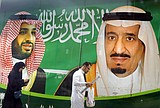Oil price war, Mecca ban are latest risks by Saudi prince
Aya Batrawy | Hagadone News Network | UPDATED 5 years, 11 months AGO
DUBAI, United Arab Emirates (AP) — Saudi Arabia’s Crown Prince Mohammed bin Salman is behind the kingdom's boldest and riskiest moves in decades, most recently shutting down Islam's holiest sites to pilgrims to stymie the spread of a new virus and the government's decision to slash oil prices in what analysts say has sparked a price war with major producer Russia.
As his father's favored son, the 34-year-old prince oversees nearly every major aspect of the country’s defense, economy, internal security, social reforms and foreign policy. With no deputy, he is the only foreseeable heir to the crown and its absolute powers.
The prince's headline-grabbing path to power has been paved with controversy, conflict and combat. Here are some of Prince Mohammed's riskiest gambles:
REFORMING THE KINGDOM
Royal decrees to lift the ban on women driving and allowing women to obtain a passport and travel abroad without male permission mark the most significant advancement for women’s rights in the kingdom. These decisions have largely eroded key parts of male guardianship laws and curtailed powers of the once-feared ultraconservative religious police.
They also opened an era of broader social liberalization in the kingdom. Prince Mohammed has permitted concerts, allowed movie theaters to open and removed gender-segregated barriers separating single men from women in restaurants and cafes. Other key reforms included allowing girls to play sports in government-run schools and allowing all women into sports stadiums as spectators.
The decisions are part of the prince's efforts to transform the kingdom economically in the face of lower oil prices and a burgeoning youth population. His brashness on other fronts, however, has rattled foreign investors, and his efforts to diversify away from oil face steep challenges.
JAILING CRITICS
At the same time, he has launched far-reaching crackdowns on perceived critics. The prince was widely criticized around the world for the killing of Saudi dissident and Washington Post columnist Jamal Khashoggi by agents who worked for him. The prince insists he had no knowledge of the operation. No senior officials have been held responsible.
Dozens of critics in Saudi Arabia are jailed or facing trial, including women's rights activists who say they have been tortured, as well as human rights activists, clerics, writers and academics.
There have also been allegations the prince may have sent malware that hacked into Amazon founder Jeff Bezos' phone, and U.S. prosecutors allege Saudi Arabia recruited two Twitter employees to gather confidential personal information on thousands of accounts.
CUTTING TIES WITH QATAR
Saudi Arabia and the United Arab Emirates led a diplomatic assault on Qatar that began in mid-2017. They along with Egypt and Bahrain cut transport links and diplomatic ties with Qatar and accused it of supporting terrorism.
Qatar denies the allegations and says the moves against it are politically motivated. Rather than force a change in its policies, Qatar allied closer with Saudi rivals Turkey and Iran.
OVERSEEING A DEVASTATING WAR IN YEMEN
In his role as defense minister, the prince has overseen a years-long war in Yemen that pushed millions to the brink of famine and sparked a widespread cholera outbreak. Rights groups say the Saudi-led coalition’s airstrikes have killed civilians in what amounts to war crimes.
The war has failed to dislodge Iranian-allied rebels from the capital, Sanaa. The Yemeni conflict has also drawn widespread condemnation from around the world and has prompted resolutions by multiple Western legislatures to halt arm sales to the kingdom.
CRACKDOWN ON PRINCES
The prince has upended royal norms by targeting senior members of the royal family.
In recent days, his forces detained the king's brother, Prince Ahmed bin Abdelaziz, and the king's nephew and former counterterrorism czar, Prince Mohammed bin Nayef. People close to the royal court say the arrests were a warning to royals feeling disenfranchised to fully back the crown prince.
In late 2017, the prince locked up top royals, officials and senior businessmen for up to several months in the luxurious Ritz-Carlton hotel in Riyadh in an unprecedented anti-corruption sweep that helped him consolidate power. Many were forced to sign over billions of dollars in assets for their freedom in secretive agreements.
ARTICLES BY AYA BATRAWY

Iran asks for billions in loans as virus death toll climbs
TEHRAN, Iran (AP) — Iran said Thursday it asked the International Monetary Fund for a $5 billion loan to fight the coronavirus, the first time since the 1979 Islamic Revolution that it has sought such assistance, in a staggering admission of how fragile its economy has become amid the epidemic and punishing U.S. sanctions.

Saudis' arrest of 2 princes called a warning to royal family
DUBAI, United Arab Emirates (AP) — Saudi Arabia's King Salman was shown in state media Sunday in apparent good health and working, just days after the arrest of two senior princes triggered speculation about a possible coup attempt or a sudden deterioration in the king's health.

Saudis' arrest of 2 princes called a warning to royal family
DUBAI, United Arab Emirates (AP) — Two senior princes in Saudi Arabia are under arrest for not supporting Crown Prince Mohammed bin Salman, who has consolidated control of all major levers of power with the support of his father, King Salman, two people close to the royal family said Saturday.







